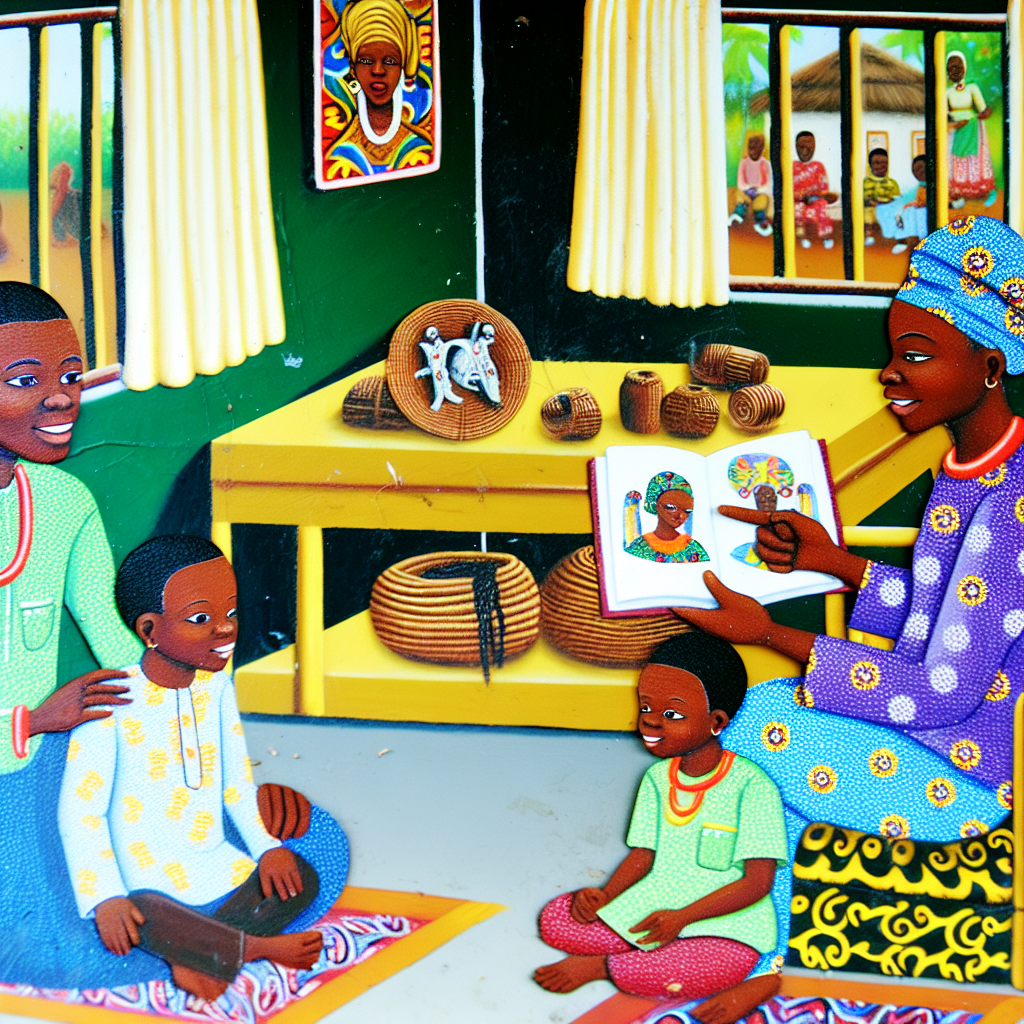Introduction to Nigerian Cultural Values in Parenting
Nigerian culture is rich and diverse, emphasizing strong family ties.
This cultural framework profoundly impacts parenting styles across the nation.
Nigerian values prioritize respect, discipline, and a strong sense of community.
Traditionally, children are viewed as a reflection of their families.
Consequently, parents strive to instill desirable traits in their offspring.
Many parents in Nigeria emphasize communal upbringing.
Extended families often play a significant role in child-rearing practices.
This approach fosters a sense of belonging and social responsibility.
Furthermore, respect for elders is a core value in Nigerian households.
Children are taught to honor their parents and other authority figures.
Such respect shapes a child’s behavior and social interactions.
Discipline is also an essential aspect of Nigerian parenting.
Parents utilize various forms of discipline to teach right from wrong.
These methods often include both verbal and non-verbal communication.
Additionally, education is highly valued in Nigerian culture.
Parenting Made Just for You
Get personalized Parenting Solutions tailored to your child’s needs. Transform your parenting journey with expert guidance in 1-3 days.
Get StartedParents encourage their children to prioritize academic achievement.
Education is seen as a pathway to a better future.
In this context, storytelling serves as a vital educational tool.
Parents often share tales that communicate moral lessons.
This practice helps reinforce cultural values while educating the child.
Overall, Nigerian parenting reflects a blend of tradition and modernity.
As cultures evolve, these values adapt while remaining foundational.
Importance of Family in Nigerian Culture
The Role of Extended Families
The family unit remains vital in Nigerian culture.
In Nigeria, families often extend beyond the nuclear model.
Extended families typically include grandparents, aunts, uncles, and cousins.
These relationships strengthen social ties and community bonds.
Moreover, extended families provide a support network for parents.
This system alleviates individual parenting burdens.
Children benefit from the wisdom of older generations.
Unveil the Perfect Name that Tells Your Family's Story
Let us help you find a name that embodies your family's values, traditions, and dreams. Our personalized consultation weaves cultural insights to create a name that's uniquely yours.
Get StartedThey learn life skills from various family members.
Thus, everyone contributes to upbringing and education.
Furthermore, extended families foster a sense of belonging.
Children grow up understanding their heritage and roots.
In addition, cultural values are passed down through these families.
Respect, responsibility, and hard work are deeply ingrained.
Families hold gatherings that enrich cultural practices.
These events reinforce shared traditions and beliefs.
Consequently, children gain a stronger identity.
As they grow, they learn to navigate societal expectations.
Finally, the extended family acts as a safety net in crises.
This ensures children always have guidance and support.
Teaching Respect and Obedience: Core Nigerian Parenting Values
The Importance of Respect in Nigerian Culture
Respect is a cornerstone of Nigerian culture.
It shapes interactions between individuals of all ages.
Parents teach children to respect elders and authority figures.
This value fosters strong familial and community bonds.
Moreover, respect encourages children to appreciate diverse perspectives.
Instilling Obedience through Guidance
Obedience is highly valued in Nigerian households.
Parents guide children through rules and expectations.
Consistent discipline teaches the importance of adhering to family values.
This obedience nurtures a sense of responsibility in children.
Additionally, it prepares them for societal roles as they grow.
Methods to Teach Respect and Obedience
- Model respectful behavior as a parent.
- Encourage open discussions about respect and its significance.
- Reinforce rules with clear consequences for disobedience.
- Use storytelling to illustrate the importance of respect.
- Initiate family activities to strengthen relationships and values.
Fostering a Respectful Environment
Creating a respectful home environment is vital.
Parents should practice active listening to their children.
This demonstrates that everyone’s views are valuable.
Encouraging respectful communication enhances relationships.
Furthermore, it helps children develop essential social skills.
Consequences of Ignoring Respect and Obedience
Neglecting these values can lead to various issues.
Children may struggle with authority and social interactions.
It can lead to a breakdown of family dynamics.
Ultimately, this neglect may affect their future relationships.
Ensuring adherence to respect and obedience promotes harmony.
Find Out More: Why Emotional Intelligence Is Crucial for Parenting in Nigeria Today
Integration of Traditional Parenting Practices with Modern Approaches
Understanding Traditional Nigerian Parenting
Nigerian culture deeply influences parenting styles.
Tradition plays a significant role in shaping values.
Parents emphasize respect, discipline, and community.
These values foster strong moral foundations in children.
Modern Parenting Trends
Modern parenting incorporates adaptability and flexibility.
Parents focus on empowering their children’s individuality.
Communication has become key in parenting today.
Parents encourage open discussions about feelings and beliefs.
Blending Tradition and Modernity
Pair the wisdom of elders with contemporary methods.
Active listening is a technique rooted in both traditions.
Combining structured discipline with emotional support works well.
Open dialogue builds trust between parents and children.
Creating a Balanced Environment
A balanced environment nurtures growth and development.
Parents can set guidelines and allow room for exploration.
Rituals honor cultural heritage, enhancing family bonds.
Educating children about their roots fosters pride.
Supporting Community Engagement
Community plays a crucial role in Nigerian families.
Parents should encourage participation in communal events.
Involvement helps children learn teamwork and empathy.
Nurturing relationships with neighbors strengthens support systems.
Empowering Children’s Identity
Instill values of resilience and respect for diversity.
Promote a strong sense of identity among children.
Encouraging self-expression helps build confidence.
Respect for cultural practices contributes to their identity.
The Path Forward
Integrating traditional practices with modern approaches enriches parenting.
This balance prepares children for the future.
A strong foundation of values supports their development.
Ultimately, this blend shapes responsible future leaders.
Explore Further: Parenting in a Multicultural Nigeria: Balancing Tradition and Modern Values
The Role of Spirituality and Religion in Raising Nigerian Children
Significance of Spirituality
Spirituality plays a vital role in Nigerian parenting.
It fosters a sense of identity, community, and belonging.
Moreover, spirituality helps instill values such as integrity and respect.
Parents often encourage their children to engage in spiritual practices.
These practices may include prayer, meditation, or attending religious services.
Influence of Religious Values
Religion significantly shapes the moral framework for Nigerian children.
Nigerian parents emphasize adherence to religious principles.
This approach helps nurture ethical behavior from a young age.
Additionally, many families gather for religious ceremonies weekly.
These gatherings strengthen familial bonds and communal ties.
Teaching Cultural Traditions
Parents integrate spirituality into their children’s cultural education.
They share histories and stories passed down through generations.
Emerging children learn about their ancestors’ beliefs and rituals.
This knowledge enriches their understanding of cultural heritage.
Consequently, it reinforces their connection to their roots.
Developing a Moral Compass
Spiritual and religious teachings provide a moral compass for children.
Parents guide their children through ethical dilemmas.
Regular discussions about right and wrong are commonplace.
As a result, children grow up with a clear sense of accountability.
This guidance nurtures character development and self-respect.
The Role of Community
The broader community contributes to the spiritual upbringing of children.
Local religious organizations often provide support to families.
These groups create environments where children learn and grow together.
Therefore, community involvement enhances spiritual development.
Children benefit from positive role models within their communities.
Gain More Insights: The Role of Nigerian Culture in Shaping Effective Parenting Practices

Encouraging Community Engagement and Collective Responsibility
Importance of Community in Parenting
Community plays a vital role in parenting within Nigerian culture.
Engaging with neighbors fosters a sense of belonging.
Additionally, it creates a support system for parents and children.
Collective Responsibility in Child Rearing
Child-rearing is seen as a communal effort in many Nigerian communities.
This philosophy encourages everyone to contribute to a child’s growth.
Shared responsibilities help instill cultural values and morals.
Ways to Foster Community Engagement
- Organize community events and activities for families.
- Encourage children to participate in cultural celebrations.
- Promote workshops on parenting skills and cultural traditions.
Building Relationships with Neighbors
Building strong relationships with neighbors is crucial.
This creates a network of support for families.
Moreover, it encourages children to learn from different role models.
Creating Safe Spaces for Children
A good community provides safe environments for children.
Parents should advocate for shared playgrounds and recreational areas.
Safe spaces allow children to explore while being supervised by adults.
Encouraging Open Communication
Promote open communication among parents in the community.
This helps share experiences and learn from one another.
Moreover, it fosters trust and enhances collective problem-solving.
See Related Content: The Complete Guide to Successful Nigerian Parenting in the 21st Century
Navigating Modern Challenges: Balancing Tradition and Globalization
Understanding Tradition and Its Role
Tradition influences how Nigerian parents raise their children.
Nigerian culture emphasizes respect, hard work, and community.
These values foster strong moral character in children.
Moreover, parents play an essential role in passing down traditions.
Storytelling is a powerful tool for teaching cultural values.
The Impact of Globalization
Globalization presents new challenges for modern parenting.
Access to diverse cultures can lead to mixed values.
Children are exposed to different norms and behaviors online.
This exposure may conflict with traditional Nigerian values.
Parents must navigate these cultural shifts carefully.
Strategies for Balancing Values
Open communication is a key strategy for parents.
Discussing cultural values helps children understand their significance.
Encourage children to ask questions about their heritage.
Additionally, incorporate cultural practices into daily life.
Participating in community events strengthens cultural ties.
Creating a Supportive Environment
Families should create spaces where Nigerian values thrive.
Encourage friendships that respect cultural backgrounds.
Involve extended family in children’s lives for support.
Participating in Nigerian cultural events fosters a sense of belonging.
Highlight the positive aspects of both tradition and modernity.
Embracing Change While Holding On
Flexibility is vital when adapting to change.
Embrace new ideas while maintaining core cultural values.
Teach children the importance of adapting to different environments.
Encourage respect for diverse opinions and practices.
Ultimately, balance enriches the parenting experience.
Promoting Cultural Heritage through Language and Storytelling
The Role of Language in Cultural Identity
Language forms the backbone of cultural identity.
It connects people to their heritage and traditions.
Speaking a native language can instill pride in children.
Encourage your kids to use Nigerian languages at home.
This practice promotes cultural continuity and understanding.
The Power of Storytelling in Parenting
Storytelling serves as a powerful tool for cultural education.
It conveys morals, values, and historical significance.
Share folktales and legends that resonate with Nigerian culture.
Engaging narratives captivate children’s imagination.
Stories passed down through generations enrich family bonds.
Integrating Language and Stories in Daily Life
Make language learning fun and interactive for kids.
Incorporate songs and rhymes in Nigerian languages.
Host family storytelling nights to explore cultural tales.
Utilize books and media that reflect Nigerian heritage.
This integration fosters a love for cultural traditions.
Encouraging Bilingualism
Bilingualism enhances cognitive skills in children.
Encourage your kids to learn both English and a Nigerian language.
Provide learning resources tailored to their age and interests.
A bilingual approach broadens their understanding of the world.
Fluent communication in multiple languages opens doors.
Additional Resources
Child Rearing Practices in Eastern Nigeria: Implications for Social …
Factors that influence parents’ and informal caregivers’ views and …




